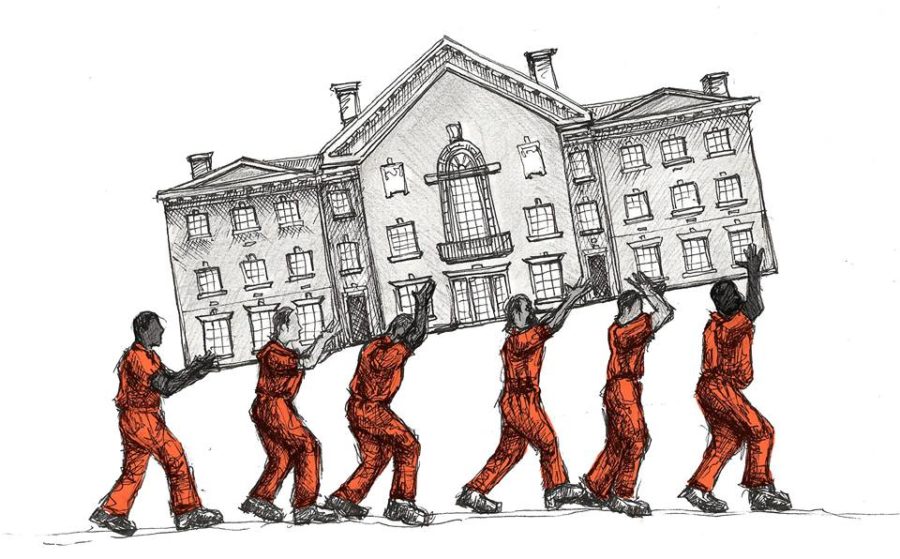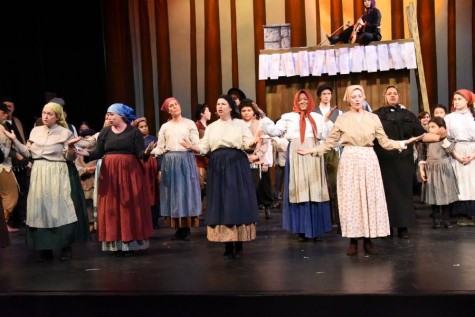13th and What American History Students Don’t Get To Learn
December 7, 2017
Today’s prison industrial complex is modern-day slavery. Ava DuVernay’s Academy and Emmy Award winning documentary 13th lays bare the soul of America and challenges audiences to re-think their views on the American justice system and its impact on black Americans.
The film explores how history has so deeply institutionalized racism into the fabric of American policy and culture that, in 2017, 152 years after the 13th Amendment made slavery “illegal,” the US makes disproportionate amounts of money off incarcerated black people and people of color. Though the amendment clearly states that slavery and involuntary servitude are illegal, it leaves an exception for those receiving “punishment for crime whereof the party shall have been duly convicted.”
As DuVernay illustrates, although slavery has been abolished on paper, decades of policy in the American legal system promotes a brand of justice consistent with slavery. After the 13th Amendment was passed, the South still needed free labor to maintain their slavery-based economy. Courts began the process of disrupting black communities, forcing free black people to “work for the state under convict leasing.” At the same time, through disenfranchisement after the Reconstruction Era, courts institutionally suppressed African Americans’ voting rights. Later, in the South, the Jim Crow era heavily enforced racial segregation and repression under laws cited as “separate but equal.” In the 1960s, black communities were devastated by the impacts of Nixon’s “War on Drugs,” sparking the exponential growth of the prison population.
By the late 20th century, mass incarceration disproportionately targeted POC. Today, the US has “5 percent of the world’s population but 25 percent of the world’s prisoners.” While only 13% of Americans are black, of the 2.1 million Americans currently incarcerated, 40% are black.
DuVernay expertly weaves narrative and stark data to explore the prison industrial complex and the role that the American Legislative Exchange Council (ALEC) plays in writing up “draft legislation.” ALEC brings together lawmakers with corporations, effectively offering businesses opportunities to influence and profit from American policies, making it easy for Republican legislators to support the prison-industrial complex.
Although the 13th powerfully illustrates the history behind the amendment and its impacts, are American history students really learning about this in school? In American history classes at SSFS, students do not discuss this correlation. In the past, the African American History class discussed issues of mass incarceration. The class was discontinued due to a lack of interest from students. According to history teacher Bob Hoch, the history department “is more inclusive” now than “in the past.” Classes discuss prominent black figures in American history and “spend time on the civil rights movement.” In contrast, says Hoch, “a lot of history classes [outside SSFS] don’t make it to the civil rights movement. They run out of steam.” Students do not discuss the prison industrial complex in classes and Hoch agrees that the history department “can always do more” and “should never be satisfied.”
In an effort to broaden the scope of history curriculum at the school and educate students about the realities of institutional racism, could American History classes start incorporating lessons from 13th? The department has made significant curricular advances over the past couple years in an effort to make curriculum less white and Eurocentric. For 13th to be integrated into curriculum, history department chair Kathy Laughlin said she would have to “review how much we do already discuss” issues of racial justice. She believes “it might be different in AP classes,” where curriculum is geared towards the exam in May. Class content in AP US History (APUSH) is often determined by how much the college board focuses on issues of racial justice.
My goal is not to see history as something that is stagnant and past, but to see history as something that’s a living, breathing phenomenon
— Kathy Laughlin, History Department Chair
“Just a couple years ago, says Laughlin, ”there was some controversy with the AP history exam. APUSH was redone. There was some states that thought there was an overemphasis on certain history, including African American history, and a deemphasis on what those states thought was appropriate American history. So [the College Board] rewrote it a second time.”
APUSH students will again take the re-written exam this May. Are APUSH and other American history students missing out on crucial and oft-ignored history? If so, Laughlin is open to change. She explains,
“My goal is not to see history as something that is stagnant and past, but to see history as something that’s a living, breathing phenomenon…I think that even ancient history is still alive because we are always getting new perspective and new information. It is our obligation to incorporate that into standing curriculum, regardless of what it is…Some more parochial schools might have a problem with adjusting curriculum for something like that, but that is not who we are and certainly not what I want our history department to be.”
As George Orwell stated in 1984, “Who controls the past controls the future. Who controls the present controls the past.” In this age of political polarization and fake news, history is rewritten by the people currently in power. It is crucial that students–the next generation of leaders– get a clear view of the past to prepare for the future they will inherit. Students, especially SSFS students, should be getting more exposure to the history and realities of black Americans. Will that come through incorporation of the 13th into curriculum? Stay tuned.
References:
Dargis, Manohla. “Review: ’13TH,’ the Journey From Shackles to Prison Bars.” The New York Times, The New York Times, 29 Sept. 2016, www.nytimes.com/2016/09/30/movies/13th-review-ava-duvernay.html.
“Mass Incarceration.” American Civil Liberties Union, ACLU, www.aclu.org/issues/mass-incarceration#current.
Neyfakh, Leon. “New Slaves.” Slate Magazine, TheSlateGroup, 6 Oct. 2016, www.slate.com/articles/arts/movies/2016/10/ava_duvernay_s_netflix_documentary_13th_reviewed.html.
Sakala, Leah. “Breaking Down Mass Incarceration in the 2010 Census.” Prison Policy Initiative , 28 May 2014, www.prisonpolicy.org/reports/rates.html.
“13th (Film).” Wikipedia, Wikimedia Foundation, 1 Dec. 2017, en.wikipedia.org/wiki/13th_(film)#cite_note-dargis-3
Image: http://bluestockingsmag.com/wp-content/uploads/2015/02/SAPIC.jpg






